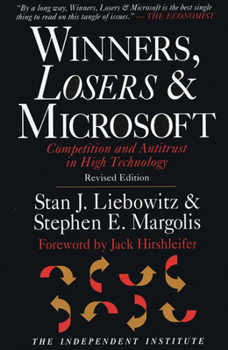Winners, Losers & Microsoft: Competition and Antitrust in High Technology
Select Format
Select Condition 
Book Overview
Few issues in high technology are as divisive as the current debate over competition, innovation, and antitrust. Analyzing famous examples of economic "lock-in" by dominant corporations of supposedly inferior products, this book makes the case that free markets in high technology industry deliver better products to consumers, at lower prices, without government intervention. This publication's careful scholarship, well-founded hypotheses, and refutations of previously accepted theories--extending far beyond the Microsoft case--make this publication a vital piece of understanding for the future of technology and economics.
Format:Paperback
Language:English
ISBN:0945999844
ISBN13:9780945999843
Release Date:March 2001
Publisher:Independent Institute
Length:302 Pages
Weight:1.52 lbs.
Dimensions:0.7" x 6.1" x 9.0"
Customer Reviews
5 ratings
Brilliant debunking of current antitrust law
Published by Thriftbooks.com User , 23 years ago
Forget Microsoft. This book will make you doubt everything you've ever been taught about lock-in, bundling, and the ease with which market dominance can be abused.But don't forget about Microsoft entirely--the book makes clear that the conventional wisdom about how the company achieved dominance could lead to "remedies" that would have a terrible effect on the software market as a whole--inevitably dooming winners to constant hamstringing or worse in order to enforce an artificial measure of competition.The movie puts the lie to much that has been said about Microsoft by its critics, competitors, and even its advocates. Certainly no one connected to Microsoft has made such a devastating rebuttal of the charges against it. This book is a must-read for those interested in the outcome of that case.
An incisive book shedding light far beyond the MSFT case
Published by Thriftbooks.com User , 24 years ago
This book is unfortunately titled as it is really primarily about bringing real data and rigor to bear on many of the conventional "stories" about the economics of the new economy, rather than dwelling on the Microsoft antitrust situation. Clearly, the new economy tends to be characterized by more network effects, increasing returns to scale, and general "winner-take-all" effects than the historical economy. However, certain stories about early lock-in effects of technologies that are inferior, but that by luck got the early lead, have been uncritically passed from author to author. Examples are the QWERTY keyboard, VHS vs Betamax, Windows vs Apple, etc. Liebowitz and Margolis show that most of these stories do not hold up under close examination -- that in fact, these are not examples of the market failing to take the "right path". Actually, the market generally seems to get it right. This book is also the best we have seen in its treatment of the overall economics of information technology standards.
It's about time this work is made available for everyone.
Published by Thriftbooks.com User , 26 years ago
Liebowitz and Margolis have done research on intellectual property issues for over two decades. Their work on new technologies began over a decade and a half ago. Their piece on the Fable of the Keys, was the lead article in the Journal of Law and Economics in 1990. Unfortunately, their other work on path dependency has languished in less well-known journals. It is a wonderful asset finally to have all their work on technological lock-ins put together in this one volume, and accessibly written for anyone who is interested in the topic. I've been a long-time Microsoft user/hater, but I find most of the arguments put forward by the authors to be very compelling: When MS products receive top ratings, those products tend to dominate the market and prices fall. I'm not sure I agree with most software reviewers that MS IE is better than Netscape, but perhaps that's a personal preference. But as I said, this book is a superb and accessible summary of the authors' work on path dependency and is a telling condemnation of BOTH sides in the antitrust suit agains Microsoft.
Best book on the subject.
Published by Thriftbooks.com User , 26 years ago
A great book. Must reading for anyone interested in the economics and politics of high technology markets. Explodes a number of myths. Eg. If Microsoft software dominates the PC market because they control the Windows operating system why are Excel and Word the number one products in the Macintosh market? Liebowitz and Margolis dug up hundreds of software reviews to provide evidence for their views. By the way, as was pointed out in the review of the book in the WSJ, Liebowitz and Margolis are academic economists who have been studying and writing about this issue for almost 10 years - long before the Microsoft anti-trust trial started. The book is about a lot more than Microsoft in anycase.
Great Book
Published by Thriftbooks.com User , 26 years ago
There are a lot of myths about why products succeed or fail. Many claim that customers get "locked into" products simply because they arrive on the scene first even when much better products are available. Some claim that Microsoft has taken over different markets despite inferior software simply because of the monopoly that it has in operating systems. Liebowitz and Margolis provide straightforward, convincing, and imaginative evidence that these claims are false.It is amazing how many stories like the superiority of the DVORAK keyboard hang around for years with no supporting evidence. They make for great stories, but as these authors point out they are false.If you want to learn about how markets work, read this book.Finally, the previous commentor's remarks about these authors being bought off is offensive and false. Liebowitz and Margolis wrote about these issues a decade before Microsoft became involved in its current legal problems. Anyone who reads this book will realize that Microsoft would have been a lot better off if they had hired them rather than the lame effort they got from the MIT business school dean.





